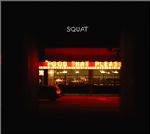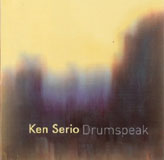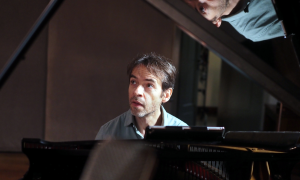Home » Jazz Articles » Interview » Joelle Leandre: On Freedom and Responsibility
Joelle Leandre: On Freedom and Responsibility
 "You're playing like Jimi Hendrix." That was the nicest compliment that French bassist Joelle Leandre received in her first tour of Israel and the Palestinian Authority in late November, 2007. Leandre's last solo concert was in Ramallah before an attentive audience that was mostly unfamiliar with her resume as one of the most creative musicians of the last forty years. "I was on fire that concert," she tells. "Maybe like Hendrix."
"You're playing like Jimi Hendrix." That was the nicest compliment that French bassist Joelle Leandre received in her first tour of Israel and the Palestinian Authority in late November, 2007. Leandre's last solo concert was in Ramallah before an attentive audience that was mostly unfamiliar with her resume as one of the most creative musicians of the last forty years. "I was on fire that concert," she tells. "Maybe like Hendrix."
Leandre is one of those rare musicians that, for many years, you know you love intuitively. For years you closely follow their careers—collecting every item in their rich discographies; reading every review about their releases; and studying their musical and artistic collaborators' resumes in order to get a better sense of their world. You spend hours on the internet trying to figure out how to lay your hands on one of their recordings for a remote Japanese label, and than you meet them and it all makes sense.
The more you get to know Leandre, the more you love her as an artist and as a human being. She is much more than one of the greatest bass players living today, a musician with amazing technique and a rich vocabulary on her instrument; she's a musician that can weave her extensive knowledge of classical music with the compositional innovations of the last century's most forward-thinking composers, the evolutionary development of free jazz and the non-idiomatic free improvisation into a daring and coherent body of work.
She is so passionate and articulate about her art—idealistic and political outspoken, funny and unpretentious—that you're easily drawn totally into her world. And than all around her seems and sounds obvious—her cellular ring-tone of the Tarzan howl ("the real Johnny Weissmuller," she confirms), the touch of her hands that can malfunction electric gadgets, her gentle bowing of the bass that hypnotized the deaf, old dog of her host, Israeli bass comrade Jean Claude Jones, or the passionate way that she uses to drive shy and careful students during her master classes to the complete musical unknown, just by telling them, "Have fun and love each other."
2008 is going to be an important one for Leandre. She is about to publish an autobiographical book, a documentary film about her will be released in the spring to film festivals around Europe, and some intriguing recordings including a recent duet reunion with Anthony Braxton—twenty years after she first played in his ensemble—and a first recorded collaboration with trumpeter Roy Campbell are also due to be released.
Leandre played four concerts in Israel—a first-time duet with oudist Sameer Makhoul at the Oud Festival of Jerusalem; a trio with bassist Jean Claude Jones and reedman Steve Horenstein; a sextet with saxophonists Assif Tsahar, Albert Beger and Ariel Shibolet, pianist Daniel Sarid and drummer Haggai Freshtman; and a solo bass recital. All were recorded for future release. The interview with Leandre was conducted in Jerusalem, with the kind help of Jean Claude Jones, who assisted in translating from French into English.
Chapter Index
- The Subversive Leandre
- The Beginning: Liberating the Bass
- The Great Teachers: John Cage, Derek Bailey and Giacinto Scelci
- Free Improvisation and Feminism
"All my life is meetings and experiences, chaos, pure accidental connections, archeology of sounds, loves," says Leandre. "And you have to be open to all these meetings and experiences, to say yes to them. And I try to mix all of these meetings and experiences and put it in my music. For twenty-five years I learned the classical music, the new music and the free jazz, this is my trilogy. Black jazz gave me a lot, the political thing to play your music, it liberates you. Jazz is so important, it gives the impression, expression and humanity of freedom, and we don't have it in white music. The graphic scores of the new music composers are also important. They open possibilities for you as a musician. Humans, too, live in a kind of trilogy, and music too. There is the brain, the thinking; then the heart, the soul, the feelings and beat; and than the sex, the jubilation of the body, the way music goes through all your body, a vibration, life is vibration. This is my trilogy.
"I learned quite a lot, and you never finish learning, and than you have to unlearn for another twenty-five years, and nobody is giving you the key how to do it. You have to be in the street, meet different people, learn arts, go to galleries, read books, read a lot, to know politics. We are politically involved in this life, just by being human beings, being responsible. For me it's impossible not to know the news of the world, and in the music all is included.
align=center>
Joelle Leandre, Steve Horenstein and Jean Claude Jones at HaZira, Jerusalem
"I'm an angry, angry person, about the politics, the society, the culture, where the money goes. Artists have to be subversive; we want to change the world in our egoistic profession, and in our profession a lot is wrong. We see a lot of shit in the composed music. They want a kind of stupid repetitive culture. They want to keep the power, not to develop who you are as a human being, an individual. I like Tosca, but I want a little more balanced world. All these concert halls receive money for the 856th concert of the Fifth of Beethoven by some Chinese pianist. I don't care [about]. We don't care. Let the dead sleep. Give the money [to] the live people, a little bit, to the schools. Why don't you listen to the sounds of this century, to creative jazz? People on the street could have a better perspective
"All made me be me, especially when you are coming from a family with no library, low culture. You need to take strong decisions to be you. This is my life, and the podium was always the bass." . class="f-right">
The Beginning: Liberating the Bass
"I come from a very poor family in Aix-en-Provence, south of France. Not much money at home. I started to play very young, when I was seven years old, by chance. The music teacher proposed a classical hour once a week and I started on the recorder, a plastic one, and was very fast. I told my parents the same year that I want to make music. They looked at me in a bizarre way; 'music is not for us, we don't have money.' But they put me in a conservatory in Aix-en-Provence and I started all the theoretically difficult training. There, one day, I listened to a pianist at the piano class, my ear at the door, and I was so touched and that's how I started the piano. I practiced the piano in our kitchen with a paper keyboard, two octaves, just by hammering the notes. I did that for five months.
"The same year the contrabass teacher opened a class and was looking for some students. My brother Richard started the bass and eight months later, when I was nine years old, I started playing the bass too, standing on a small chair. I was fascinated by the bizarre, tender body, and the sound. I was a silent girl, most of the time by myself, and the instrument became something to embrace, a friend to me.
"I cried for almost two years, it was so hard. The finger positions are so rude, and my teacher, Pierre Delescluse, was so severe, impatient but also funny. For six years I was playing the two instruments—piano and bass. Than Delescluse said to me, "You know, the music is fantastic, but it's better that you play the bass. There are thousands of piano players, but with the bass you can travel and be free.'
"Barre Phillips was the trigger for who I am. I listened to him in a concert while I still in school, so young, and he was playing solo bass. It was a first meeting with another kind of energy, another bass energy. I was fascinated. He joked, talked with the audience, and played so well. He has a lot of music. I still can recognize his sound anytime.

"I passed the very difficult examination for the Conservatoire National Superieur de Musique de Paris. I worked a lot, I practiced eight hours a day, and than I arrived to Paris very young, alone, eight hundred kilometers from home, in a very chaotic time. The studies were very competitive, very high level, practicing all the times. And the more you knew your tool deeply, the more you could express yourself. I finished first, won First Prize for the bass, all the jurors, all men, picked me unanimously as the best.
"I was 19 years old and was interested in the new music. The scores of such composers as John Cage, Earle Brown, Christian Wolff and Morton Feldman were so bizarre and complex; the roles for the bass offered more than the usual classical repertoire, and I was very happy to discover the new positions, new roles and new sounds for the bass. But I have to tell you that the new music was quite often boring; there are masterpieces, but I played a lot of shit-written compositions. I was interested in the political sense, what is the position of the bass? Why does the bass have that position in the orchestra? Why only the low sounds? Why only as an accompanying instrument? I was bored with the hierarchy of the bass in the classical music. I did not want this position. It is the same in the commercial, classical jazz. I cut that radically. I don't want that position.
"At that time I listened to jazz, bought a lot albums, and went to listen to a lot of jazz, even though I was starving. It was unusual then, 1969, to see a lonely woman, nineteen years-old, listening to jazz at clubs. Only couples and men—not women—went to listen to jazz. Women were considered groupies. The jazz bass players were playing the bass with their fingers. Jean-François Jenny-Clark, and the free jazz people—Alan Silva, Bill Dixon, Frank Wright—wonderful, creative musicians, playing their own music. I told Silva last summer during the Vision Festival how much I was fascinated by his bass playing at that time and he was so happy."
class="f-right">
The Great Teachers: John Cage, Derek Bailey and Giacinto Scelci
After finishing her studies, Leandre continued to be involved with new music, as a freelance member for such ensembles as I'Itinéraire, 2E2M and l'Ensemble Intercontemporain, but decide not to take a full position in any of them. She composed music for a theater production of William Shakespeare's Trolius and Cressida. "I met a wonderful, beautiful American woman," Leandre says, "Olga Bernard, pure intellectual; she survived Auschwitz and was a friend of Michel Foucault and Samuel Becket, a teacher in Harvard. She listened to my compositions for dance, and asked me to compose music to a Shakespeare play.
"In 1975 I had a terrible car accident. I almost died, it was very tragic. But it gave me a lot of strength to be me. It was like a wakeup call about the urgency and the need to be deeply conscious, to be myself. And a year later I got a one-year scholarship to study at the Center for Creative and Performing Arts in Buffalo. Cage, Feldman and Brown were there. I went to downtown New York to listen to free jazz—Leroy Jenkins, Butch Morris Cecil Taylor, Cooper-Moore—see dance and performance arts. I played in New York with Derek Bailey, Peter Brötzmann and Evan Parker.
align=center>
Joelle Leandre at HaTeiva, Jaffa, performing John Cage's composition for a closed piano and vocal, "The Wonderful Widow of Eighteen Springs," rearranged by Leandre for bass and vocal, with the blessing of Cage
"I met John Cage before in Paris in the new music ensemble l'Itinneraire. I read his books Silence: Lectures and Writings (Weselyan, 1961) and For the Birds (Marion Boyars, 1981) when I was twenty years old. It was a shock to read his writings—fantastic books, the painting, the poetry, all the long graphic scores that were not easy. It was a shock, like listening to jazz for the first time. I played his music and I hope that I understood a bit of his music.
"Cage was a sage, he hated jazz music, for him it was stupid music, and he did not like improvisation, but he was not rude like the European composers, who all looked at jazz as popular music. He laughed all the time. He never could say that anything is bad, he was laughing about life, all the time happy. 'Isn't that great, Joelle?' he was saying all the time.
"Cage is very important to me, he is my spiritual father. I worked with him face-to-face, we talked a lot, and we were very close for fifteen years. He gave me the chance to be myself—like Derek Bailey, in a way. It was like a box that he gave me [that] can be opened any time, a field of possibilities. His philosophy is very important. He gives you the sense of freedom, but freedom doesn't really exist. He gives you the confidence and the responsibility to be you, to act, in sounds, to recompose in a way. He was in love with sounds, all were natural for him. 'Let sound be what it is,' he said. He always asked why this or [that] kind of sound is considered a bad sound? Who decided this hierarchy? Who has the power?
"And I'm against that shit hierarchy. Why the bass is after the first violin, second violin, first, second and third trumpet, the flutes—and only the end is the bass? In jazz it is exactly the same, you have the composer, the instrumentation, and the exact roles. In free jazz and free improvisation I play sounds, I play timpani, I play trumpet, I don't play bass, but than you have to clean a lot shit, and again, no body gives you the key.
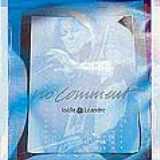 Merce Cunningham. We were eight composers and eight choreographers. Every day you had to compose, from four minute compositions up to fifteen minutes, you had to invent all the time. And in the nights Cunningham was sitting in one corner with his dancers, and in the other corner Cage with the musicians, and nobody knew what was going [on] between the two of them. [At] eight o'clock we began a performance that was open to the public. Cage was drinking whiskey—a little bit drunk—and was picking from a little basket the name of the musician and the name of the dancer, and Cunningham was shouting, 'Are you ready? Go.' Nobody was ready, but you learned how to free your ego. It was difficult for your ego. You had to be open to what is happening, in music and in life. And after each performance Cage smiled and said, 'Isn't that great?'"
Merce Cunningham. We were eight composers and eight choreographers. Every day you had to compose, from four minute compositions up to fifteen minutes, you had to invent all the time. And in the nights Cunningham was sitting in one corner with his dancers, and in the other corner Cage with the musicians, and nobody knew what was going [on] between the two of them. [At] eight o'clock we began a performance that was open to the public. Cage was drinking whiskey—a little bit drunk—and was picking from a little basket the name of the musician and the name of the dancer, and Cunningham was shouting, 'Are you ready? Go.' Nobody was ready, but you learned how to free your ego. It was difficult for your ego. You had to be open to what is happening, in music and in life. And after each performance Cage smiled and said, 'Isn't that great?'"
In Buffalo, New York, Leandre discovered the compositions of reclusive Italian composer Giacinto Scelsi , and studied with him for two years in Rome, becoming one of his closest friends until his death in 1988. "Scelci is another important influence," explains Leandre. "He was a very spiritual person—a Buddhist—and talked about the one sound, just one sound that has a life, death, and soul; sounds and vibrations that give love, and he touched me most deeply. You play sounds. He provided me with a complete sound world.
" Derek Bailey is as important as Cage to me. George Lewis, the trombone player, saw me playing in London, and came to me afterwards and said, 'Joelle, you play like you're mad. You must play with Derek,' and a year later I played with Derek. When you play with Derek it is very intensive, but we never talked about music, before or after. He hated to talk abut music, and I love to talk and talk about music, the organization, the duration or the decisions. He just said, 'Play.'
"Derek hated to give workshops. I asked him what he did in workshops, and he said that he sat and said, 'Play.' That's all. For him everything is accepted, the window is open. Everything has a sense, and it works together; even in a pure anarchy, pure chaos, something will happen. The music determines who you are, and the process is your life, all your life, it determines the vocabulary, the decisions, your identity, your energy. You'd always know when Derek is playing, even if he was playing with another twenty guitarists. I'm interested to be [as] honest as that, that it will be definitely Joelle that is playing, playing her shit, with her passions, passions and patience. This is the most important thing. The music is who you are."
class="f-right">
Free Improvisation and Feminism
"Improvisation is a natural gesture," says Leandre. "You have to be yourself; it's more than just improvisation. When you love your tool, when you approach it, when you exercise your instrument, you give your perception and your sense. But it's not developed because the Maestro wants to be the Maestro, and he and the society do not want to destroy this hierarchy. The society does not want you [to] be an individual. That's why they call the music school conservatories. Pauline Oliveros told me once that we should change the name to improvisatory.

"Improvisation for me is equal to composition. I begin improvisation with no goal, complete emptiness; totally empty, but you always come with your culture and knowledge of your tool, and you have to be you, that is the minimum. You begin with love, music is a love story, with my feeling, with my body, and one piece pushes to the [next] one. Every musician can do it, free improvisation, but they have to change something in their heads.
"The moment we improvise our memory is dead—we remember only the first gesture. The character of the piece is built on the first gesture, it gives a sense, an order, repetition, and than you select. I include melody, but it is not an obligation. It's a process, very fragile, a work in progress, built on character. For me, playing for the sake of playing, totally free, I can do it for a short while, but than it's boring for me. I know some radical people that don't want any melody, tonality or a-tonality. Not me. We don't have to forget everything because we improvise.
"Improvised music is the fastest on the planet. It's like life and death, and you have to trust the other players with your life. If I play with someone for ten or fifteen years we play differently, there is a fidelity. The more we know the person, more meaning arrives. For me it's imperative to trust the other.
"Sound is not feminine or masculine. You don't have the shit roles and rules. You play your sounds, your music, with your culture, your loves and hates, you play who you are, and you [no longer] have the hierarchy, roles and rules. Improvisation is the only music in this world where everything can go inside—gender, skin, education, culture. It's like Peter Kowald said, it's a global village, all can enter. It is very important. The only music we can meet with hierarchy, if I'm black, I'm yellow or I'm strong . The only music that comes with gallantry comes from man's story.
"The free improvisation music is open—even dangerous—with a little bit of ego because we go on stage, but it's all for the moment, because each moment is unique, even if you are playing like shit, every moment is rare, something happens, for you, for the collective. I don't like perfection; we are human beings, with a lot of contradictions, we are fragile. The more that you become an individual, the more you can open your mouth, in a way. It's about life, and life is action, all the time.
AAJ: You called your trio Les Diaboliques as a joke on the way men perceive you, as independent, opinionated and creative women? JL: It was a conscious joke. We used to burn the women witches. Maybe we continue to be the witches. Photo Credit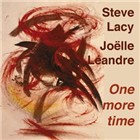

Irène Schweizer was a very important example for me in her life, in her individuality. She is like a sister to me. She is a Maestra. I remember seeing her for the first time in Paris, in an all-woman ensemble with Maggie Nichols and six or seven musicians. It was wild. A year later I called her and we began to play together. I was playing at that time with a French singer, Annick Nozatti, and than we began to play as a trio with Irene, and later it turned to Les Diaboliques, with Maggie.
Irene is a strong feminist, and she comes from jazz, an extraordinary musician, she can play whatever she wants. She was the only woman playing in the sixties with black musicians, with strong guys like Brotzmann [and] Kowald, playing on the piano with her elbows, and she plays the drums, too. For ten or fifteen years she was the only woman in the free music scene in Europe and, slowly, Maggie, me and few others arrived. We fight sometimes because I speak too much about music, and she's like Derek, always saying, "We don't care, we play what's good."
Selected Discography
Francois Houle/Joelle Leandre/Raymond Strid, 9 Moment (Red Toucan, 2007)
Joelle Leandre & Kevin Norton, Winter in New York—2006 (Leo, 2007)
Joelle Leandre/Pascal Contet, Freeway (Clean Feed, 2007)
Joelle Leandre/Masahiko Satoh, Voyages (BAJ Records, 2006)
Joelle Leandre, At the Le Mans Jazz Festival (Leo, 2006)
Lauren Newton/Joelle Leandre, Face It! (Leo, 2006)
Quartet Noir, Lugano (Victo, 2005)
Steve Lacy/Joelle Leandre, One More Time (Leo, 2005)
Barre Phillips/Joolle Leandre/William Parker/Tetsu Saitoh, After You Gone (Victo, 2005)
Joelle Leandre, Concerto Grosso (Jazz Halo, 2005)
Ramon Lopez Flowers Trio, Flowers for Peace (Leo, 2004)
Joelle Leandre/India Cooke, Firedance (Red Toucan, 2004)
Ramon Lopez Flowers Trio, Flowers for Peace (Leo, 2004)
Joelle Leandre/Akosh S., Györ (Reqords, 2003)
Sylvie Courvoisier/Joelle Leandre/Susie Ibarra, Passagio (Intakt, 2002)
Joelle Leandre/Kumi Wakao, John Cage #4 (Mesostics, 2000)
Daunik Lazro/Joelle Leandre/Carlos Zingaro/Paul Lovens, Madly You (Potlatch, 2001)
Les Diaboliques, Live at the Rhinefalls (Intakt, 2000)
Joelle Leandre/William Parker, Contrabasses (Leo, 1998)
Derek Bailey/Joelle Leandre, No Waiting (Potlatch, 1998)
Lauren Newton/Joelle Leandre, 18 Colors (Leo, 1998)
Joelle Leandre, No Comment (Red Toucan, 1997)
Vinny Golia/Joelle Leandre/Ken Filiano, Haunting the Spirits Inside Them... (Music & Arts, 1995)
Joelle Leandre/Rüdiger Carl, Blue Goo Park (FMP, 1993)
Giacinto Scelci/Joelle Leandre, Okanagon (Hat Hut, 1993)
Joelle Leandre/Carlos Zingaro, Écritures (In Situ, 1990)
For a more comprehensive discography please visit Leandre's European Free Improvisation Pages or consult Francesco Martinelli's book Joelle Leandre: Discography (Bandecchi & Vivaldi Editore, Italy, 2002; ISBN: 88-8341-015-7).
Top Photo: Courtesy of Vision Festival
All Other Photos: Eyal Hareuveni
Tags
PREVIOUS / NEXT
Support All About Jazz
 All About Jazz has been a pillar of jazz since 1995, championing it as an art form and, more importantly, supporting the musicians who make it. Our enduring commitment has made "AAJ" one of the most culturally important websites of its kind, read by hundreds of thousands of fans, musicians and industry figures every month.
All About Jazz has been a pillar of jazz since 1995, championing it as an art form and, more importantly, supporting the musicians who make it. Our enduring commitment has made "AAJ" one of the most culturally important websites of its kind, read by hundreds of thousands of fans, musicians and industry figures every month.



